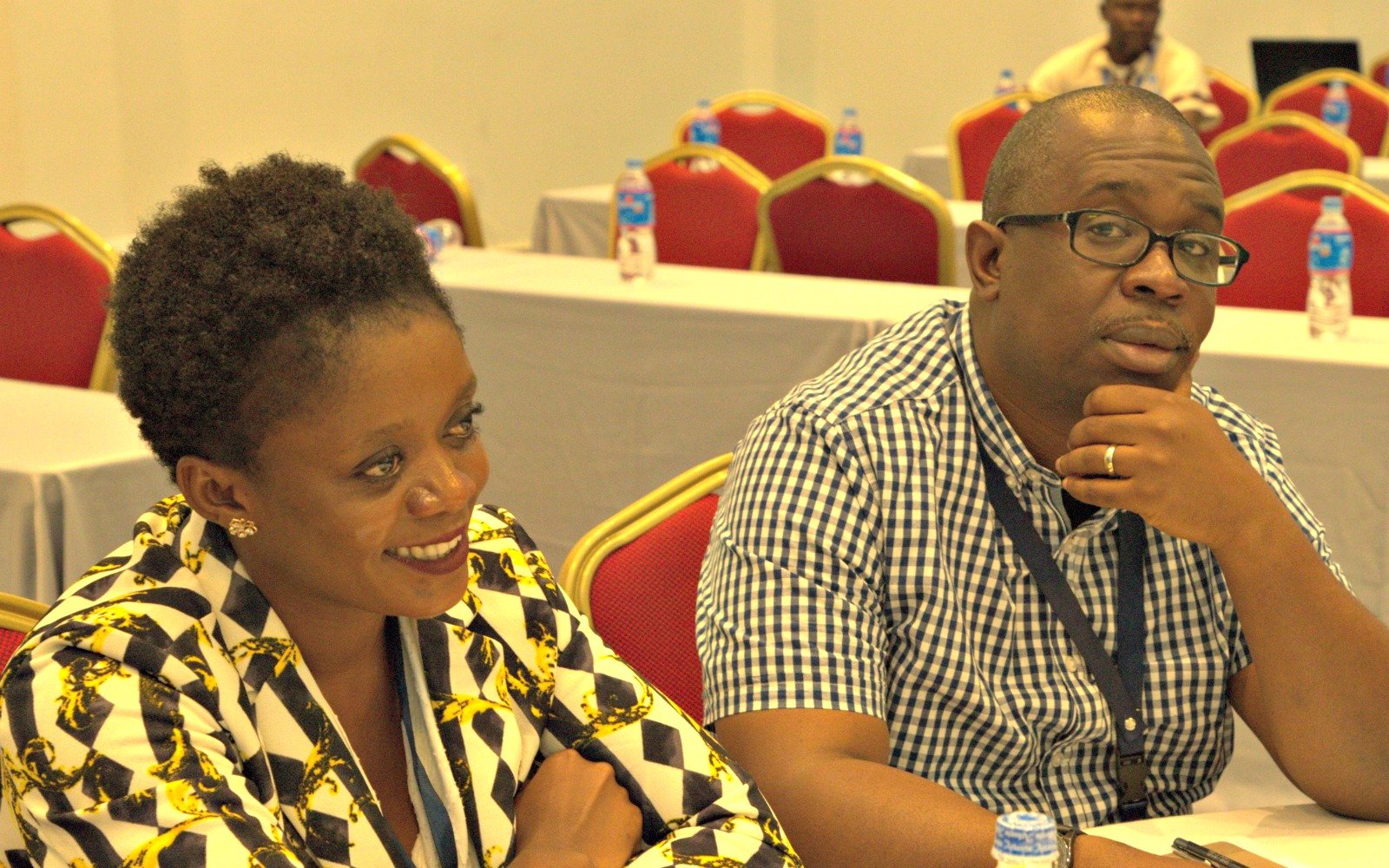
Rep. Rustolyn Dennis, Montserrado Electoral District #4, seeks clarifications on building effective constituency relationship, while Rep. Lawrence Morris, Montserrado County Electoral District #1 looks on.
SHARE
When the Liberian House of Representatives convened its first sitting on January 15, 2018, more than half of the lawmakers seated in the chamber were reporting for their first day in elected office. The October 2017 elections ushered in a wave of change, with voters in 43 of the 73 districts choosing new lawmakers to represent them. This trend, however, is not new to Liberia. The 2011 general elections and the 2014 senatorial elections also showed that Liberian voters are quick to replace incumbents who do not effectively represent the interests of their constituents.
The Orientation built up my confidence to serve as a lawmaker by exposing me to how a committee works and how the legislature operates.
– Rustonlyn Dennis (LTP/New female Legislator)
Led by the Speaker of the House, Dr. Bhofal Chambers, these new lawmakers are on a mission to ensure that the legislature as a body that works for Liberians. To help these new legislators perform more effectively, NDI, with funding from the United States Agency for International Development (USAID) through its Strengthening Political Parties program, organized an orientation in February for members of the House of Representatives. Held an hour and a half outside of the capital, Monrovia, 55 lawmakers traded the House chamber for a hotel conference center. Over three days, representatives discussed their roles and responsibilities as lawmakers, the steps of the legislative process and key policy issues that will be under consideration in the coming year that have a potential to improve citizens’ lives.
Newly elected President George Weah spoke at the event, encouraging lawmakers to leave the campaign behind and focus on working for the Liberian people.
President Weah at Member Orientation

Session facilitators included former and current legislators who discussed the rules of the body and the legislative process. In addition, the event included presentations from heads of legislative units that provide support to lawmakers including Legislative Information Service, Legislative Budget Office and the Office of the Chief Clerk.
“The orientation session on the introduction of the various support offices was very helpful to the new legislators, and it reinforced where to get help for the old legislators,” said Representative Mariama Fofana (Lofa County, District 4). “It lets you as a lawmaker know you have resources and people available to help assist you in your work,” she said.The session also included presentations and experience sharing with experts from countries that share Liberia’s bicameral presidential system: Nigeria and the United States. Experts included former Chief Clerk of the Nigerian House of Representatives, Niyi Abjiboye; Dave Hunter, former Chief Clerk of the Montana House of Representatives (United States); and Izmira Aitch, Legislative Assistant for Representative Gwen Moore of the U.S. House of Representatives. Aitch joined the session as a technical expert from the House Democracy Partnership (HDP), a bipartisan commission of the U.S. House that works with partner countries to support legislative development.
In a session on constituent relations, veteran representative Thomas Fallah (Montserrado, District 5) issued a frank warning to lawmakers about not being attentive enough to their constituents. “To be honest, some of us use the people as a vehicle only to get our posts. After elections, we rarely go back, not bearing in mind they have authority to vote us out,” he warned. Good constituent relations builds a more solidified relationship with the people you represent and helps lawmakers understand the issues that affect people in their district. U.S. congressional staffer Aitch added her experience working with constituents in Gwen Moore’s district in Wisconsin. While constituency services are widely linked with “bread and butter” needs of voters, it also helps to foster accountability, accessibility and transparency, Aitch noted.
The Orientation served as an eye-opener on not only how the legislature works but also how to maintain contact with my constituents.
– Samuel Enders (Independent Candidate/New legislator)
The orientation also focused on key policy issues that will likely dominate the agenda in the coming months. To provide information on these issue areas, representatives from Liberia Land Authority, Liberia Revenue Authority, as well as other USAID funded partners and civil society groups, provided lectures on topics including land reform, decentralization, education, tax reform and the county social development funds. The orientation also included a session on the role of party caucuses and committees in helping to shape and support policy solutions.
Although the orientation targeted lawmakers, their chiefs of staff also attended the orientation and gained a better understanding of basic legislative office management and meeting constituents’ needs.


